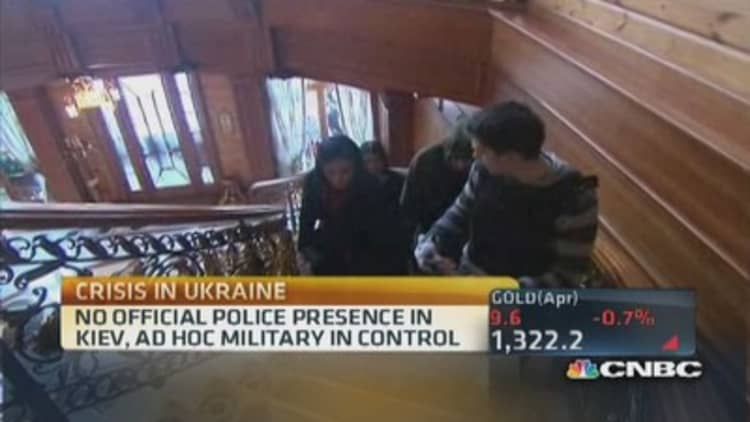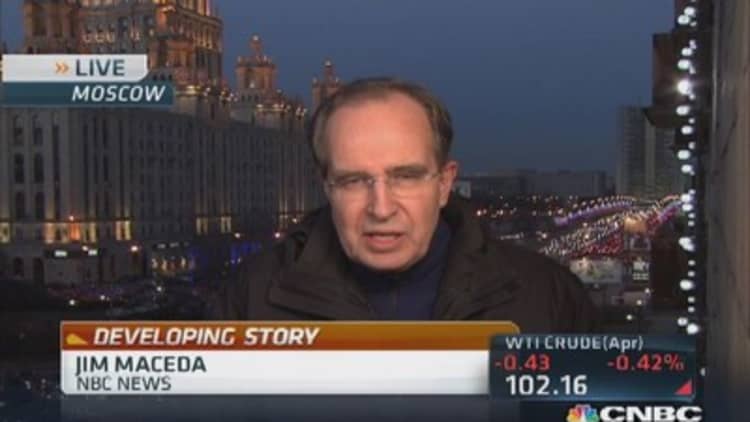If Crimea decides to secede from Ukraine—especially with what appears to be direct efforts from Russia to help that happen—there's almost nothing Ukraine or anyone else can do to stop it.
That's the emerging consensus among experts both within the region and elsewhere, as Ukraine and Russia edge toward a dangerous showdown over the Crimean peninsula and the critical outlet it provides to the Black Sea.
With Russian troops reportedly on the move in Crimea late Friday, President Barack Obama warned "there will be costs" for direct intervention, saying Russian military action "would represent a profound interference in matters that are the business of (the) Ukrainian people."
But Ukraine and the West have few realistic options to put into play against Russia.
"If Crimea decides it wants to be part of Russia, all Ukraine can hope to do is get the EU and U.S. to intervene on its behalf," said Olga Oliker, associate director of Rand Corp.'s International Security and Defense Policy Center.
But direct intervention by Western powers is highly unlikely, Oliker added.
Hard-line members of the Russian-speaking majority on the Crimean peninsula called for the region to secede from Ukraine this week, and political leaders in the region have vocally opposed new leadership in the capital Kiev.
Russian armed forces announced unexpected military exercises in the area, and on Thursday, gunmen bearing the Russian flag seized government buildings in Crimea. On Friday, armed men took control of two Crimean airports, bringing Ukrainian accusations of a Russian invasion directed by President Vladimir Putin.
(Read more: Fugitive Yanukovych will 'struggle for Ukraine's future')
"It is very clear that Russia is positioning itself to formulate a secessionist movement there," said Ian Brzezinski, a senior fellow at the Atlantic Council focused on trans-Atlantic security.
"These guys in uniforms, all carrying the same assault weapons—these are not indigenous groups out of Crimea," Brzezinski said of the gunmen who occupied government buildings in Crimea before Russian troops began to move. "This is an organized, orchestrated effort by clearly trained military units. These forces didn't show up without Putin's approval."

Russia's Black Sea Fleet is headquartered in the Ukrainian port of Sevastopol and has been for more than a century. Russia currently holds a lease to use the port as the base for the fleet through 2042. Sevastopol is not a major commercial port for Ukraine—Odessa is more important for shipping into and out of the country—but it is a major military port for Russia.
Access to warm-water ports is critical for Russia and has been throughout its history. The country will act strongly to protect its interests in Crimea, naval and otherwise, said Edward Mermelstein, an attorney and advisor on cross-border investment in Russia.
"They are already doing it," he said. "Aside form influencing local politics, the military is more than ready to step in to protect the Russian population."
(Read more: Russian jets patrol Ukraine border, markets pull back)
Regardless, Russia faces "real risks" in Crimea, especially economically, said Brzezinski. Alienating the West could put its standing in the Group of 8 in jeopardy. Being seen as a bully toward its smaller neighbors also endangers Putin's vision for greater Eurasian economic and political integration, with Russia at its core.
Vulnerable time for Ukraine

The ongoing crisis has caught Ukraine at a time when it's off balance politically and economically. The country's pro-Russia president, Viktor Yanukovych, fled the country only a week ago after deadly fighting between police and opposition protesters. Ukraine launched a new presidential campaign on Tuesday.
The locked-down scene on the streets in Sevastopol stands in stark contrast to the situation in Ukraine's capital, Kiev, where CNBC this week observed no official police presence and official buildings guarded by men armed with sticks and homemade shields.
Violence in the streets badly disrupted the Ukrainian economy, prompting U.S. Secretary of State John Kerry to say this week that the United States is formulating a $1 billion loan guarantee for Ukraine and may deliver direct aid as well.
(Read more: Putin says Russia to consider aid to Ukraine)
"Putin wants to take advantage of the economic collapse of Ukraine—which is the fault of Yanukovych—and take back as much territory as he can, and I think he can go pretty far with those plans," said a major businessman in Russia who requested anonymity in an interview with CNBC.
"Putin considers Ukraine as his 'little sister' who is not really in the position to do anything without the approval of the 'older sister,' " he said.
A US market rally faded late Friday on rumors of Russian military action in Crimea, bringing to light the general anxiety about developments in Ukraine, especially over the last two days.
—By CNBC's Ted Kemp and Dina Gusovsky. Follow Ted on Twitter at @TedKempCNBC and Dina on Twitter at @DinaGusovsky. CNBC Chief International Correspondent Michelle Caruso-Cabrera contributed to this report.



